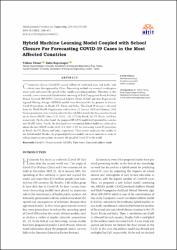| dc.contributor.author | Yılmaz, Yıldıran | |
| dc.contributor.author | Buyrukoğlu, Selim | |
| dc.date.accessioned | 2023-02-15T07:28:11Z | |
| dc.date.available | 2023-02-15T07:28:11Z | |
| dc.date.issued | 2021 | en_US |
| dc.identifier.citation | Yılmaz, Y. & Buyrukoğlu, S. (2021). Hybrid Machine Learning Model Coupled with School Closure For Forecasting COVID-19 Cases in the Most Affected Countries. Hybrid Machine Learning Model Coupled with School Closure For Forecasting COVID-19 Cases in the Most Affected Countries, 8(2), 123-131. http://doi.org/10.17350/HJSE19030000222 | en_US |
| dc.identifier.issn | 2148-4171 | |
| dc.identifier.uri | http://doi.org/10.17350/HJSE19030000222 | |
| dc.identifier.uri | https://hdl.handle.net/11436/7595 | |
| dc.description.abstract | Coronavirus disease (Covid-19) caused millions of confirmed cases and deaths worldwide since first appeared in China. Forecasting methods are essential to take precautions early and control the spread of this rapidly expanding pandemic. Therefore, in this
research, a new customized hybrid model consisting of Back Propagation-Based Artificial
Neural Network (BP-ANN), Correlated Additive Model (CAM) and Auto-Regressive Integrated Moving Average (ARIMA) models were developed for the purpose of forecast
Covid-19 prevalence in Brazil, US, Russia and India. The Covid-19 dataset is obtained
from the World Health Organization website from 22 January, 2020 to 6 January, 2021.
Various parameters were tested to select the best ARIMA models for these countries based
on the lowest MAPE values (5.21, 11.42, 1.45, 2.72) for Brazil, the US, Russia and India,
respectively. On the other hand, the proposed BP-ANN model itself provided less satisfactory MAPE values. Finally, the developed new customized hybrid model was achieved to
obtain the best MAPE results (4.69, 6.4, 0.63, 2.25) for forecasting Covid-19 prevalence
in Brazil, the US, Russia and India, respectively. Those results emphasize the validity of
our hybrid model. Besides, the proposed prediction models can assist countries in terms of
taking important precautions to control the spread of Covid-19 in the world. | en_US |
| dc.language.iso | eng | en_US |
| dc.rights | info:eu-repo/semantics/openAccess | en_US |
| dc.subject | Covid-19 | en_US |
| dc.subject | Neural network | en_US |
| dc.subject | ARIMA | en_US |
| dc.subject | Time series | en_US |
| dc.subject | Correlated additive mode | en_US |
| dc.title | Hybrid machine learning model coupled with school closure for forecasting covıd-19 cases in the most affected countries | en_US |
| dc.type | article | en_US |
| dc.contributor.department | RTEÜ, Mühendislik ve Mimarlık Fakültesi, Bilgisayar Mühendisliği Bölümü | en_US |
| dc.contributor.institutionauthor | Yılmaz, Yıldıran | |
| dc.identifier.doi | 10.17350/HJSE19030000222 | en_US |
| dc.identifier.volume | 8 | en_US |
| dc.identifier.issue | 2 | en_US |
| dc.identifier.startpage | 123 | en_US |
| dc.identifier.endpage | 131 | en_US |
| dc.relation.journal | Hittite Journal of Science and Engineering | en_US |
| dc.relation.publicationcategory | Makale - Uluslararası Hakemli Dergi - Kurum Öğretim Elemanı | en_US |


















